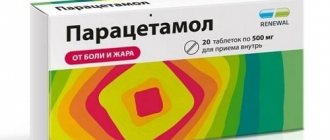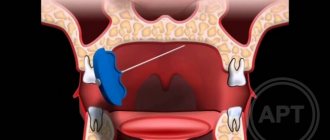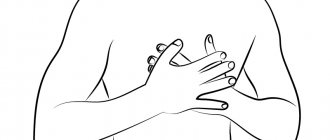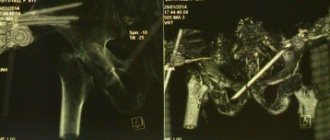Effect of the drug
Paracetamol has been considered a popular and sought after pain reliever and antipyretic for half a century. Efficiency is associated with uniform distribution across tissues.
The active ingredients block the action of prostaglandins, which are sources of pain. This eliminates moderate pain. The drug also copes well with fever. This serious symptom can indicate a variety of infectious and inflammatory diseases.
Before taking it, you should consult your doctor and read the instructions to prevent side effects. You should strictly follow the dosage, otherwise complications related to the functioning of the heart and kidneys may occur. The risk increases when taken concomitantly with alcoholic beverages.
Signs of poisoning do not appear immediately. Initially, your general well-being may only slightly deteriorate.
Contraindications and side effects
Often people taking paracetamol or drugs containing it experience pain in the liver. This medicine can negatively affect this organ and sometimes even cause death when taken in large dosages. There are cases where taking paracetamol without any medical supervision led to exacerbations of liver pathologies.
Patients taking medication without receiving a doctor's prescription should be aware of the risk of complications. It is necessary to carefully choose the dose, avoiding overdose. If you have liver diseases such as cirrhosis and hepatitis, taking the drug is strictly prohibited.
People with bronchial asthma can take paracetamol only after consulting a doctor
Caution should be exercised by people with bronchial asthma. They should also avoid using paracetamol unless advised by a doctor as it increases the likelihood of bronchospasm. It can develop in patients who are hypersensitive to aspirin and other non-steroidal drugs.
You should be aware that large amounts of medication taken over a long period of time can negatively affect the metabolic system, suppressing the functioning of the thyroid gland.
There is no information on the effects of paracetamol on the kidneys, but consultation with doctors is a good idea as some patients have developed kidney failure when the dose is increased. People who abuse alcohol are also at risk.
People suffering from serious heart, kidney, respiratory and liver diseases should exercise caution when using the drug. An overdose of paracetamol primarily affects the liver. As a result, everything can lead to organ necrosis, which can be fatal.
Despite the fact that particularly careful attention is required to select a safe dose, even a relatively small amount of medication can lead to complications.
In what cases is it effective?
The drug has an effect in various febrile conditions associated with elevated temperature. Particularly effective for colds.
Paracetamol is able to cope with pain of varying intensity. It is often used for headaches and toothaches. Helps women with pain during menstruation.
The drug is allowed to be taken by pregnant women and babies from 3 months. For children there are baby candles and syrup. The product is often given to babies who are starting to cut their teeth.
Ibuprofen, cortisone or paracetamol? What will help in the fight against coronavirus
The French Ministry of Health said that when infected with coronavirus, it is strictly forbidden to use a number of anti-inflammatory drugs, as they can only worsen the patient’s condition. We are working with Russian experts to find out whether such medications can really cause complications and in what cases it is necessary to take paracetamol.
Dangerous drugs?
French Health Minister Olivier Veran said on his Twitter page that taking a number of anti-inflammatory drugs like ibuprofen or cortisone can be a factor that worsens the infection. “If you have a fever, take paracetamol,” he advised.
However, some Russian experts do not share this opinion. In particular, clinical virologist Georgy Vikulov, in a dialogue with Moscow 24, said that to date there are no studies confirming this. “Ibuprofen and paracetamol are non-steroidal anti-inflammatory drugs. They are allowed in certain dosages as antipyretics, recommended by WHO and leading specialized organizations both abroad and in Russia.”
“, the specialist explained. Regarding COVID-19, there are no studies whose results would indicate that ibuprofen and paracetamol should not be used.
Vikulov added that paracetamol and ibuprofen are allowed both in the treatment of children and pregnant women. “When an antipyretic effect is required, nothing is more effective than non-steroidal anti-inflammatory drugs”
, the expert believes.
At the same time, the virologist confirmed the negative consequences for the body after using cortisone. “Cortisone, corticosteroids, and cortisone-related substances are not recommended because they cause significant immune suppression.”
, says Vikulov.
According to the specialist, any hormonal drugs are dangerous for any viral infections. And COVID-19 is no exception.
When and how can you take paracetamol?
Today, people often abuse antipyretic and anti-inflammatory drugs because such drugs are actively advertised, experts believe. At the same time, the decision on the use of such drugs and their dosage should be made by the attending physician, emphasized clinical virologist Georgy Vikulov. Paracetamol can only be used as prescribed by a doctor. If there are indications for use, he will recommend non-steroidal anti-inflammatory drugs with antipyretic or anti-inflammatory effects, depending on what is required.
Professor of the Department of Hospital Therapy of the First Moscow State Medical University named after I.M. Sechenov Sergey Yakovlev
said that antibiotics are used to combat bacterial pneumonia. But if pneumonia is caused by viruses, including coronavirus, then antibiotics are useless. Antibiotics have no effect on the virus. And to prevent this coronavirus, you don’t need to take any medications, they are pointless.
In addition, Yakovlev
reminded that any medicine can have side effects. Starting from allergic reactions and ending with damage to the liver, kidneys and other organs. Therefore, you should not abuse self-medication. The main thing is to remember about hand hygiene and follow the recommendations of the Ministry of Health and Rospotrebnadzor on the prevention of coronavirus.
Virologist Georgy Vikulov also added that antibiotics should be prescribed only by doctors after examination and consultation. “The sale of antibiotics in a pharmacy without a doctor’s prescription is a violation of the federal program to combat the spread of antibiotic resistance in the Russian Federation until 2030,” the specialist emphasized. Moreover, if you use antibiotics with or without reason, then at the moment when such a medicine is really needed, it simply will not work. Professor of the Department of Hospital Therapy at the First Moscow State Medical University named after I.M. Sechenov Sergei Yakovlev explained that in case of severe fever (temperature more than 39 degrees), it is necessary to reduce the temperature, especially in children. “Paracetamol in this regard is the most neutral and safe, so it will be optimal”
, says Yakovlev. However, he also emphasized that a doctor should prescribe the medicine.
More details: https://www.m24.ru/articles/obshchestvo/18032020/156530?utm_source=CopyBuf
Paracetamol for fever
Paracetamol can be used at a temperature if it has reached 38.5 degrees or higher. This is explained by the fact that elevated temperature has a negative effect on harmful microorganisms, and, therefore, allows you to recover faster.
It should be taken strictly according to the instructions, without exceeding the dosage. The tablet should be taken with a sufficient amount of drinking water, which will speed up the absorption of the active ingredient and minimize the negative impact on the liver.
Single dose 400-500 mg. If the temperature reaches 40 degrees, the dose can be doubled.
For children and adults, a single dose is determined based on weight. A child can take the drug 4 times per day. Duration of treatment – up to 3 days.
How to take for headaches
The medicine is quite effective for headaches. But when taking it, it is worth considering some features. The tablets should not be taken on an empty stomach. Before taking the pill, you need to have at least something to eat. If there is no appetite, then you can drink a glass of water.
You need to take the tablet with plain water. It is not recommended to use coffee and tea, as the effect may be reduced to zero. If unbearable pain is felt, then you can take 1000 mg of the drug at a time. You can take the medicine again after at least 4 hours. You can take no more than 4 tablets per day. This regimen does not apply to pregnant women (the dosage should be 2 times less).
Paracetamol is prescribed for migraines, which are characterized by persistent, throbbing pain, usually in one part of the head.
If the headache is associated with stress or a nervous condition, then 1 tablet is enough.
When is it used?
At the moment, the pharmacological industry produces quite a lot of medicines based on paracetamol. Among them, the most famous are “Panadol” and “Efferalgan”.
Paracetamol has long been known as an antipyretic and analgesic.
This medicine has two beneficial properties at the same time:
- Antipyretic
- Painkiller – relieves toothache, migraine, headache, pain arising from burns and injuries
Paracetamol for colds
When a cold appears, you need to provide timely help. Otherwise, the condition may worsen. The first signs of the disease are excessive weakness and fatigue. During ARVI, a runny nose, cough, fever, muscle and joint pain appear.
Paracetamol will reduce the symptoms of the disease and improve the patient's condition.
Very often the drug is prescribed to adults and children over 12 years of age in tablet form. If the medicine is to be taken by children, then it is worth considering an important factor - the child must weigh more than 49 kg.
Babies up to one year old can be given the drug in the form of a suspension, after a year - in the form of syrup.
In many cases, adults take 1 tablet 4 times a day. Duration of treatment – no more than 3 days.
How to take for toothache
Often toothache catches a person at the most inopportune moment. Not in all cases it is possible to go to the dentist right away. To eliminate unbearable pain and improve the condition, you can take Paracetamol.
The drug is able to stop the production of prostaglandins, which are the source of pain. The tooth stops hurting, but the inflammatory process continues to spread. If the toothache does not go away, then you should not hesitate to go to the dentist.
You need to take the medicine after meals. Relief is observed after about 15-20 minutes. You can take the pill again no earlier than after 4 hours. You can take 4 tablets per day. Paracetamol can be taken for no more than 3 days.
Features of use by pregnant women
Pregnant women often complain of toothache. Most often, the cause is caries, which appears due to the fact that calcium in a woman’s body is directed to a greater extent towards the structure of the bone tissue of the unborn baby. This causes various problems, particularly with teeth.
Paracetamol is allowed to be taken by pregnant women, but precautions should be taken. The active substance can penetrate the placenta. The minimum dose of the medicine can be taken in the 2nd trimester, when the child’s organs are already formed.
Before taking it, you should consult your doctor. You can drink no more than 1 tablet per day. Repeated use may cause harm to the fetus.
Paracetamol for the treatment of nursing mothers and children
Paracetamol can be taken once by a mother while breastfeeding.
If a nursing mother needs to relieve pain, doctors recommend paracetamol. It minimally passes into milk (less than 0.25%) and does not harm the child with a single use.
Breastfeeding women with toothache should take the drug immediately after feeding. Its highest concentration in a woman’s blood is achieved half an hour after administration.
It is advisable to avoid feeding during this time. Feeding a child becomes safe a few hours after taking the drug, when it is eliminated from the body.
If a child over three years old has a toothache, you can give him half a tablet of medicine. After this, you must urgently consult a dentist to eliminate the cause of the pain.











